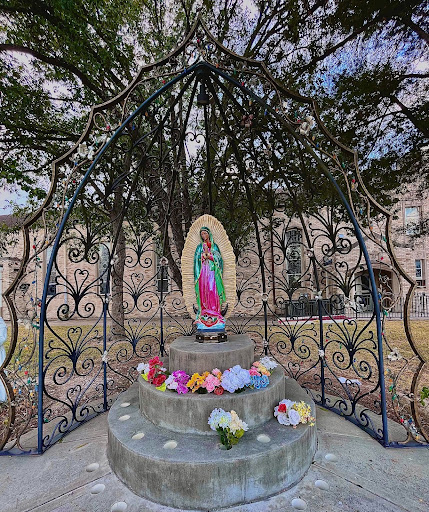
Language Is Only A Tool
Photo by John Brundage
“In the same way, the Spirit too comes to the aid of our weakness; for we do not know how to pray as we ought, but the Spirit itself intercedes with inexpressible groanings. And the one who searches hearts knows what is the intention of the Spirit, because it intercedes for the holy ones according to God’s will” (Romans 8:26-27).
Last week I began a new chapter in my seminary career—from now until the end of June, I will serve as a pastoral intern at Queen of Peace parish in Houston. I’m happy to have a break from school and the opportunity to see parish life up close. The priests there introduced me at each of the weekend masses and have helped onboard me into the rhythms of parish life and administration. Queen of Peace is a bilingual parish with a strong Spanish-speaking majority. My daily interactions with the parishioners and staff have thrown me back into the thick of language learning.
In sports, you’ll hear coaches say, “There’s nothing like game reps.” No matter how intense you run your practice, it will never exactly match the intensity of a live competition. My language journey has followed the same principle: the usefulness of one conversation in Spanish has regularly surpassed an hour on Duolingo. Despite traveling to Mexico and serving in a Hispanic parish on weekends during the year, I’m still a long ways away from being able to communicate with full confidence. But I’m starting to find my sea legs, and I’m excited to take advantage of the quasi-immersion environment I will work in.
I first felt a true desire to learn Spanish a year ago while attending an ordination in Houston. My friend and I spoke with a guy from Guadalajara. Though he didn’t speak English and we couldn’t speak Spanish, we knew enough Spanish and he knew enough English that we somehow managed to understand each other. Seeing the walls break down between us snapped me into an awareness of language I hadn’t had before.
What do I mean by that? I mean that the English language had been an extension of myself which came so naturally that I didn’t even notice it was there. Finding myself in a situation where words didn’t come as automatically as breathing, and where communication didn’t happen as automatically as speaking helped me to ‘see’ language for the first time. It was a beautiful and fascinating sight which stirred a desire to further serve and connect with others through Spanish.
I visited Mexico later that summer with only a rudimentary knowledge of the language. This trip, with its hills and valleys of language interactions, reinforced for me the idea that communication is more than words. With my substantially limited use of language, I gained a much greater appreciation for non-verbal communication. Speaking the correct words is not the only factor in communication, and more often than you might think, it’s not even the most important one. Now that I’m in Houston, I’m once again regularly having the experience of not being able to say what I want to say. Vast swaths of ideas and expressions are locked away because they’re branches on a limb I don’t have the strength to climb to yet. It’s forced me to be patient, humble, and brave, and it’s also enriched my prayer life.
How so? In case you haven’t noticed, God doesn’t communicate with us in plain English (at least most of the time). Language is a tool, and a limited one. He communicates in a deeper and more fundamental way. We cannot say everything, and not everything can be said. Buddhists have a saying: The finger pointing at the moon is not the moon, or ‘the map is not the territory.’ God is the moon; he is the territory. As beautiful and useful as language is, the Holy Spirit empowers us to commune with him directly.
In the Gospel of Matthew, Jesus exhorts his followers: “…do not babble like the pagans, who think that they will be heard because of their many words. Do not be like them. Your Father knows what you need before you ask him” (Matthew 6:7-8). There’s certainly a place for words, and even for memorized formulas in our prayer. But we must always guard against the temptation to use these like magic spells or in such a way that we act as if God doesn’t already know us. Take some time today to reflect on how you communicate with God. Do you ‘see’ how you are using language with him? Call on the Holy Spirit to intercede on your behalf and teach you how to communicate with God in a way that goes deeper than words.
John Brundage is a seminarian with the Companions of the Cross. He also writes a Substack Newsletter called Integrated Prayer.